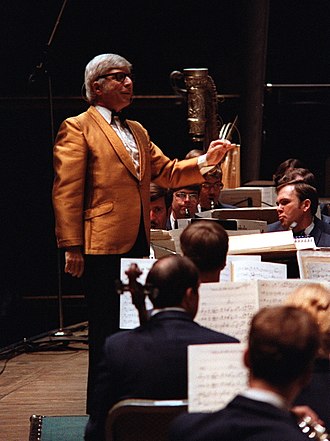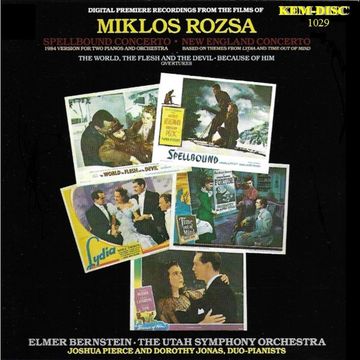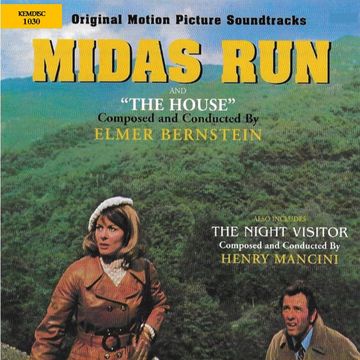
Bernstein, Elmer
Elmer Bernstein (April 4, 1922 – August 18, 2004) was an American composer and conductor known for his film scores. In a career that spanned more than five decades, he composed “some of the most recognizable and memorable themes in Hollywood history”, including over 150 original movie scores, as well as scores for nearly 80 television productions.[1] Examples of his widely popular and critically acclaimed works are scores to The Ten Commandments (1956), The Magnificent Seven (1960), To Kill a Mockingbird (1962), The Great Escape (1963), The Rookies (1972–76), Animal House (1978), Airplane! (1980), Heavy Metal (1981), Ghostbusters (1984), The Black Cauldron (1985), Cape Fear (1991), The Age of Innocence (1993), Wild Wild West (1999) and Far from Heaven (2002). Early in his career, he also scored the infamous camp classic Robot Monster.
Bernstein won an Oscar for his score to Thoroughly Modern Millie (1967) and was nominated for 14 Oscars in total. He also won two Golden Globe Awards, an Emmy Award, and was nominated for two Grammy Awards and two Tony Awards.
Bernstein was born to a Jewish family[2] in New York City, the son of Selma (née Feinstein, 1901–1991), from Ukraine, and Edward Bernstein (1896-1968), from Austria-Hungary.[3]
He was not related to the celebrated composer and conductor Leonard Bernstein, but the two men were friends.[4] Within the world of professional music, they were distinguished from each other by the use of the nicknames Bernstein West (Elmer) and Bernstein East (Leonard).[5] They also pronounced their surnames differently. Elmer pronounced his name “BERN-steen”, and Leonard used “BERN-styne”.
During his childhood, Bernstein performed professionally as a dancer and an actor, in the latter case playing the part of Caliban in The Tempest on Broadway, and he also won several prizes for his painting. He attended Manhattan’s progressive Walden School and gravitated toward music. At the age of twelve, he was awarded a piano scholarship by Henriette Michelson, a Juilliard teacher who guided him throughout his entire career as a pianist. She took him to play some of his improvisations for composer Aaron Copland, who was encouraging and selected Israel Citkowitz as a teacher for the young boy.[6]
Elmer was drafted into the United States Army Air Forces during the World War II era where he wrote music for the Armed Forces Radio.
Elmer Bernstein’s music has some stylistic similarities to Copland’s music, most notably in his western scores, particularly sections of Big Jake, in the Gregory Peck film Amazing Grace and Chuck, and in his spirited score for the 1958 film adaptation of Erskine Caldwell’s novel God’s Little Acre.
He had a lifelong enthusiasm for an even wider spectrum of the arts than his childhood interests would imply and, in 1959, when he was scoring The Story on Page One, he considered becoming a novelist and asked the film’s screenwriter, Clifford Odets, to give him lessons in writing fiction.
Career
Bernstein wrote the theme songs or other music for more than 200 films and TV shows, including The Magnificent Seven, The Great Escape, The Ten Commandments (1956), True Grit, The Man with the Golden Arm, To Kill a Mockingbird, Robot Monster, Ghostbusters and the fanfare used in the National Geographic television specials.[6]
His theme for The Magnificent Seven is also familiar to television viewers, as it was used in commercials for Marlboro cigarettes. Bernstein also provided the score to many of the short films of Ray and Charles Eames.

